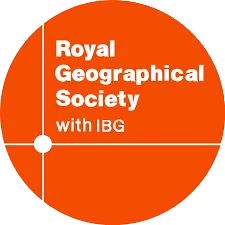Facilities
Geography and Environmental Science teaching laboratory
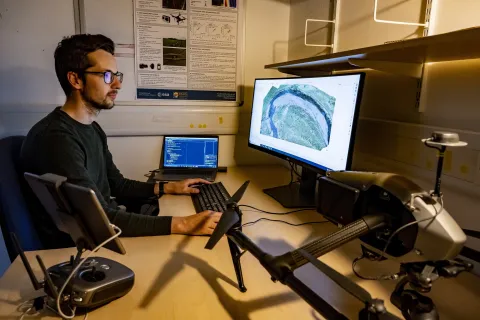
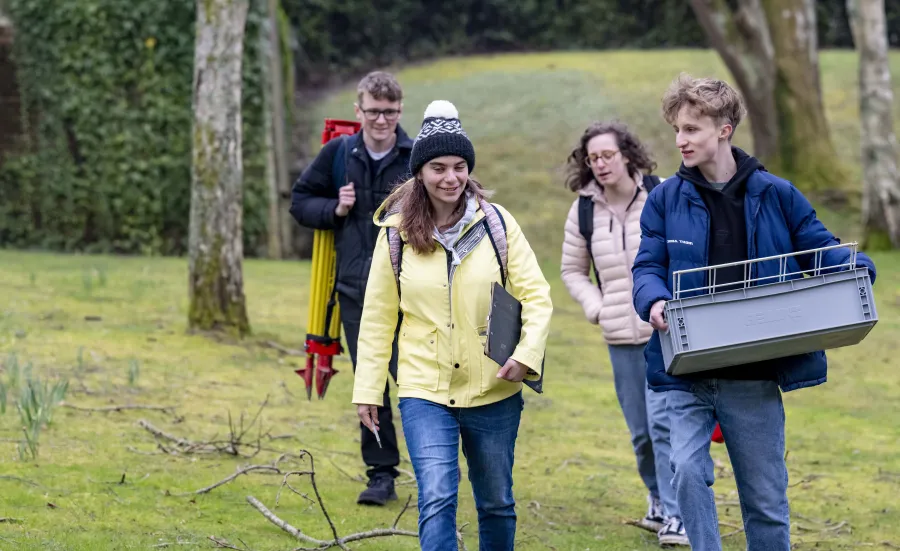
Explore how physical and human systems interact to shape our planet. On this BSc Geography degree, you’ll gain the scientific and analytical skills to understand natural processes, environmental change and the challenges impacting people and places today.
Over 3 years, you’ll study both human and physical science aspects of geography and specialise in physical geography as you progress. You’ll learn how to investigate and interpret the natural world through classroom learning, fieldwork and lab work, developing advanced techniques such as:
You’ll be taught by researchers from a top UK geography department. Their expertise in environmental change, climate systems and sustainability will guide your development as a geographer and scientist.
With their support you'll cover topics that interest you, with opportunities to study topics from glaciers to dessert landscapes or climate change and human-coastal interactions.
There are several opportunities for practical experience throughout this degree helping you understand environmental processes in real contexts and prepare you for professional practice. Alongside lab work, field activities are built into every year of study. This includes a first-year field course in the New Forest, residential trip to Tenerife included in your tuition fees and an optional third year trip to the Swiss Alps, Cambodia or Namibia.
Your personal academic tutor will support your academic and professional development, helping you choose modules and plan your career.
You can also:
Our welcoming and supportive Geography society also hosts a range of academic and social events all year, providing community and additional opportunities throughout your degree.
We regularly review our courses to ensure and improve quality. This course may be revised as a result of this. Any revision will be balanced against the requirement that the student should receive the educational service expected. Find out why, when, and how we might make changes.
Our courses are regulated in England by the Office for Students (OfS).
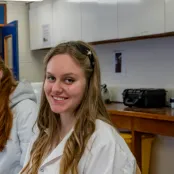
I’m enjoying how my degree takes us from lecture rooms to computer stations to laboratories, it had made me realise I have a love for lab work.
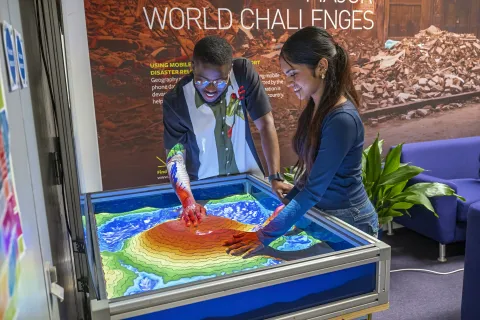

This course is based at Highfield.
This qualification is awarded by the University of Southampton.
The Course Description Document details your course overview, your course structure and how your course is taught and assessed.
ABB
Offers typically exclude General Studies and Critical Thinking.
If you are taking an EPQ in addition to 3 A levels, your offer will be: BBB and Grade A in the EPQ
We are committed to ensuring that all applicants with the potential to succeed, regardless of their background, are encouraged to apply to study with us. The additional information gained through contextual data allows us to recognise an applicant's potential to succeed in the context of their background and experience. Applicants who are highlighted in this way will be made an offer which is lower than the typical offer for that programme as follows: Grades BBC
Pass, with minimum 34 points overall with 17 points at Higher Level if no prefered subject taken at Higher Level or Pass, with minimum 32 points overall with 16 points at Higher Level if one or more prefered subjects taken at Higher Level.
We are committed to ensuring that all learners with the potential to succeed, regardless of their background, are encouraged to apply to study with us. The additional information gained through contextual data allows us to recognise a learner’s potential to succeed in the context of their background and experience. Applicants who are highlighted in this way will be made an offer which is lower than the typical offer for that programme.
Offers will be made on the individual Diploma Course subject(s) and the career-related study qualification. The CP core will not form part of the offer. Where there is a subject pre-requisite(s), applicants will be required to study the subject(s) at Higher Level in the Diploma course subject and/or take a specified unit in the career-related study qualification. Applicants may also be asked to achieve a specific grade in those elements. Please see the University of Southampton International Baccalaureate Career-Related Programme (IBCP) Statement for further information. Applicants are advised to contact their Faculty Admissions Office for more information.
DDD in the BTEC Extended Diploma. DD in BTEC Diploma plus A in A-level subject or DD in BTEC Diploma plus B in a preferred A-Level subject. D in the BTEC Subsidiary Diploma plus A A from 2 A-level subjects or D in the Subsidiary Diploma plus AB from 2 A-level subjects including at least one preferred subject.
We are committed to ensuring that all learners with the potential to succeed, regardless of their background, are encouraged to apply to study with us. The additional information gained through contextual data allows us to recognise a learner’s potential to succeed in the context of their background and experience. Applicants who are highlighted in this way will be made an offer which is lower than the typical offer for that programme.
BTEC Extended Diploma must be in a relevant subject area
DDD in the BTEC Extended Diploma. DD in BTEC Diploma plus A in A-level subject or DD in BTEC Diploma plus B in a preferred A-Level subject. D in the BTEC Subsidiary Diploma plus A A from 2 A-level subjects or D in the Subsidiary Diploma plus AB from 2 A-level subjects including at least one preferred subject.
We are committed to ensuring that all learners with the potential to succeed, regardless of their background, are encouraged to apply to study with us. The additional information gained through contextual data allows us to recognise a learner’s potential to succeed in the context of their background and experience. Applicants who are highlighted in this way will be made an offer which is lower than the typical offer for that programme.
60 credits with a minimum of 45 credits at Level 3, of which 39 must be at Distinction and 6 credits at Merit or 60 credits with a minimum of 45 credits at Level 3, or which 30 must be a Distinction and 15 credits at Merit if a preferred subject.
We are committed to ensuring that all learners with the potential to succeed, regardless of their background, are encouraged to apply to study with us. The additional information gained through contextual data allows us to recognise a learner’s potential to succeed in the context of their background and experience. Applicants who are highlighted in this way will be made an offer which is lower than the typical offer for that programme.
H1 H2 H2 H2 H2 H2 if no preferred subject is included or H1 H2 H2 H2 H3 H3 if one or more preferred subjects included.
We are committed to ensuring that all learners with the potential to succeed, regardless of their background, are encouraged to apply to study with us. The additional information gained through contextual data allows us to recognise a learner’s potential to succeed in the context of their background and experience. Applicants who are highlighted in this way will be made an offer which is lower than the typical offer for that programme.
Offers will be based on exams being taken at the end of S6. Subjects taken and qualifications achieved in S5 will be reviewed. Careful consideration will be given to an individual’s academic achievement, taking in to account the context and circumstances of their pre-university education.
Please see the University of Southampton’s Curriculum for Excellence Scotland Statement (PDF) for further information. Applicants are advised to contact their Faculty Admissions Office for more information.
D3 D3 M2 if no prefered subject included or D3 M2 M2 if one or more preferred subject is included.
Cambridge Pre-U's can be used in combination with other qualifications such as A Levels to achieve the equivalent of the typical offer where grade D3 can be used in lieu of grade A or M2 can be used in lieu of grade B.
We are committed to ensuring that all learners with the potential to succeed, regardless of their background, are encouraged to apply to study with us. The additional information gained through contextual data allows us to recognise a learner’s potential to succeed in the context of their background and experience. Applicants who are highlighted in this way will be made an offer which is lower than the typical offer for that programme.
ABB from 3 A Levels or AB from 2 A levels are included and B from the Advanced Skills Baccalaureate Wales
Offers typically exclude General Studies and Critical Thinking.
We are committed to ensuring that all learners with the potential to succeed, regardless of their background, are encouraged to apply to study with us. The additional information gained through contextual data allows us to recognise a learner’s potential to succeed in the context of their background and experience. Applicants who are highlighted in this way will be made an offer which is lower than the typical offer for that programme.
An overall distinction with grade A in the core element in the Science T-Level
Applicants must hold GCSE English language (or GCSE English) and Mathematics at minimum grade 4/C.
Find the equivalent international qualifications for our entry requirements.
If English is not your first language, you must show that you can use English to the level we require. Visit our English language pages to find out which qualifications we accept and how you can meet our requirements.
If you are taking the International English Language Testing System (IELTS), you must get at least the following scores:
If you do not meet the English language requirements through a test or qualification, you may be able to meet them by completing one of our pre-sessional English programmes before your course starts.
You might meet our criteria in other ways if you do not have the qualifications we need. Find out more about:
Find out more about our Admissions Policy.
We welcome applications from learners of all ages. Students who are aged 21 and over at the start of their undergraduate course are defined as mature by the University of Southampton. We take a holistic assessment of the application looking for academic ability and commitment to study. Typical entry requirements, which may vary from discipline to discipline, includes for example, evidence of recent formal academic qualifications or professional qualifications, relevant work experience or volunteering. You may also be invited to attend an interview with an Admissions Tutor. For some degree programmes, there may also be a Professional, Statutory and Regulatory Body (PSRB) requirement. We accept many different academic qualifications. For more information, please contact the Admissions Team.
Please contact our enquiries team if you're not sure that you have the right experience or qualifications to get onto this course.
Email: enquiries@southampton.ac.uk
Tel: +44(0)23 8059 5000
This degree consists of a set of core and compulsory modules and a selection of optional modules. You can choose your options from:
A major part of all our degree programmes is the research project. This involves personal fieldwork or documentary research, in the UK or abroad. You'll develop your topic with a member of staff who will give ongoing supervision. You'll start the project in your second year, and complete it in your final year.
This year provides a broad academic foundation in physical and human geography. Statistical and computing skills are also an important element in the early part of the degree.
You'll also study aspects of climate change, including:
You'll also attend an in-depth, non-residential field course in the New Forest, looking at both physical and human geography topics.
There is a wide choice of optional modules.
You'll take core modules in physical geography. You can learn about remote sensing for earth observation or global water resources.
The highlight is the second year field course, where you will spend a full week in Tenerife. You'll learn about life on a volcanic island (volcanology, biodiversity, hazards and natural resources) to designing and executing your own field project. This trip is included in your tuition fee.
Beyond the core modules, there are a wide range of other options to choose from. For example, you can learn advanced geographic information systems, gaining additional mastery in this highly sought after technical skillset.
You can take up to 2 modules outside geography. For example, you could explore:
In this year you'll have a broad range of advanced options to choose from. These are based on the research interests of academic staff and bring you to the frontier of current knowledge in geography.
Whether fluvial processes, urban geography or health care provision fascinate you, you'll get a sense of cutting-edge issues and debate.
You'll also have the option to travel further afield to Switzerland and Cambodia or Namibia.
In this year you'll conduct your own in-depth research on an aspect of geography you find most interesting during your dissertation project.
Want more detail? See all the modules in the course.
The modules outlined provide examples of what you can expect to learn on this degree course based on recent academic teaching. As a research-led University, we undertake a continuous review of our course to ensure quality enhancement and to manage our resources. The precise modules available to you in future years may vary depending on staff availability and research interests, new topics of study, timetabling and student demand. Find out why, when and how we might make changes.
As well as the optional modules listed here, you can also choose from a range of modules from other disciplines across the University. You'll find more information about module choices in the programme specification under 'About this course'.
You must study the following modules in year 1:
The module aims to introduce students to the broad topic of globalisation. As a team-taught module, specific topics may change with occasional changes to the teaching team. At the time of writing, specific topics include: trade and the global economy (e.g...
To give the student a basic knowledge of the main geomorphological processes involved in the shaping of the landscape. Pre-requisite of GEOG3020/GGES13. One of the pre-requisites for GEOG2032/GGES2011, and GEOG3057/GGES3019.
Explorers visit and observe different places in order to further understand the physical and cultural phenomena they encounter. This module will introduce you to methods enabling you to explore physical and human environments, in order to collect data wh...
The purpose of the module is to develop students’ ability to undertake field research in geography by practice-based learning on a fieldtrip and associated lectures. The module will give practical experience of carrying out research to ensure practical...
The module will explore risk, hazard, exposure, vulnerability, resilience, and sustainability, all in the context of climate change: how these concepts relate to the Earth's physical and ecological systems, and to cultural and socio-economic structures of...
This module aims to explore the historical development, nature and importance of Geography as a field of study, as well engaging with recent developments around what it means to be a Geographer today. It will introduce students to the key academic skills...
This module introduces students to social and economic change, cultural diversity and spatial organisation in cities and western societies. The module also provides an introduction to three main fields in human geography - urban geography, social geograph...
The module will look at the challenges posed to human societies living on a dynamic planet and how these societies adapt (or not) to a range of environmental and socio-economic hazards. Pre-requisite for GEOG2006 One of the pre-requisites for GEOG...
As well as the optional modules listed here, you can also choose from a range of modules from other disciplines across the University. You'll find more information about module choices in the programme specification under 'About this course'.
You must study the following modules in year 2:
This module introduces students to field-based Physical Geography research and includes an overseas field component. It gives students hands-on experience at collecting data and the opportunity to practice techniques to analyse and present the data colle...
The module will introduce the concepts and techniques underpinning geographic information systems.
The module will look at the basic theory and practical application of remote sensing for monitoring the terrestrial environment.
This module prepares students to undertake an independent research project as part of their final undergraduate year. In the first section of the module students will participate in a series of workshops covering a range of methods which they may wish to...
You must also choose from the following modules in year 2:
This advanced field course module is delivered as a residential fieldcourse to Namibia (primarily based at the Gobabeb Namib Research Institute). It is designed for students interested in all aspects of physical geography, human geography and environment...
The module will look at the conceptual, practical and methodological issues associated with using GIS for environmental and socio-economic applications.
Improvements in life expectancy have been one of the major achievements of the twentieth century. Around half of all children born today in the UK are expected to live to celebrate their 100th birthday and two-thirds will celebrate their 90th birthday. Th...
Coastal zones represent a small fraction of physical space on the Earth, but they are exceptionally important places to study physical and ecological dynamics of environmental change – in natural and anthropogenic systems, alike. This module examines n...
Most states claim to be democratic. This module looks at the theory of democracy, including foundational questions about political inclusion, participation, and equality. As a result, students will develop a greater understanding of what democracy require...
The aim of the course is to convey the conceptual ideas of our universe to students with no formal physics training. We will progress from Big Bang to our current understanding of the Universe. This journey starts in our Solar System and ends with discove...
According to the United Nations, India has now overtaken China as the most populous country in the world. Since the introduction of economic liberalisation policies in early 1990s, India has emerged as the world’s sixth largest economy in terms of nominal...
Society often sees school as the sole site of learning. Yet people learn from a variety of sources, in a variety of places and for various reasons. The reality is that a great deal of learning takes place in the social and cultural contexts that are offer...
The module seeks to: - explore the main evolutionary processes - consider evolution at the phenotypic as well as the molecular level - consider evolutionary processes occurring at different time scales
Freshwater Ecosystems initially considers the interplay between the physics, chemistry and biology of freshwater ecosystems. A comparative approach is adopted, in which upland streams, lowland rivers, lakes and other standing freshwater environments are c...
In contemporary neoliberal societies individuals are increasingly positioned as responsible for their own wellbeing. In the first half of this module we look at how health and wellbeing are often reduced down to a lifestyle choice. But is health and wellb...
The module aims to introduce students to field of critical development and issues related to poverty, inequality, injustice and policy. As a team-taught module, specific topics may change with occasional changes to the teaching team.
The topic is addressed from three perspectives: the science of climate change, impact and adaptation, and policy towards adaptation and mitigation. One of the pre-requisites for GGES3019
The global health module is an exciting opportunity to examine the factors associated with emerging and re-emerging infectious diseases such as the recent outbreak of Ebola and Swine Flu that quickly spread around the world, and non-communicable diseases ...
The global challenge that is 'sustainability' impacts every dimension of all of our lives. Regardless of your degree, the social, cultural, economic and environmental dimensions of sustainability have important implications for your studies, your daily ...
This module will explore how humans have been impacting the planet over recent millennia, and how more recently the increased impacts are leading to tipping points in many global systems, from biogeophysical to social. As such the module will discuss a ra...
In a world of fast and easy communication, we are increasingly working and studying alongside people from different cultural and linguistic backgrounds. Understanding our intercultural encounters allows us to develop awareness of ourselves and others, as ...
Is it necessary -- and is it possible -- for the UK and other countries to make the change from fossil fuels to renewable energy sources? And what sort of changes would be involved, on a global, national and personal scale? Is there any one renewable ener...
Are we really alone in the Universe? That's a question that has been asked across the centuries and is always evolving. The course will discuss all the environmental circumstances that seem to encourage the start of any life form and investigate the c...
GGES2004 examines long-term environmental change through the period of the glacial-interglacial cycles. These dramatic shifts in Earth's systems are fascinating to study because they show us how the environment reacted to rapid climate change in the past ...
The module will look at key concepts in cultural geography.
This module builds on the basic principles of ecology introduced in year 1, to achieve a broad appreciation of current theory and practice in population and community ecology. Lectures and practicals will explore the processes involved in the dynamic func...
This module provides an introduction to the sub-discipline of urban geography and the topics and approaches it covers, including urbanisation, urban development, urban policy, current urban challenges, and current debates in urban geography.
An understanding of the physical, chemical and biological processes involved during contamination of air, water and soil is essential if society is going to effectively monitor and control the effects of pollution using modern technology and engineering p...
The major river systems that drain the Himalayas provide water that sustains the lives and livelihoods of a significant proportion of the global population, but a variety of pressures, including population growth, the motivation to stimulate economic deve...
As well as the optional modules listed here, you can also choose from a range of modules from other disciplines across the University. You'll find more information about module choices in the programme specification under 'About this course'.
You must study the following module in year 3:
You must also choose from the following modules in year 3:
GGES3019 is a multidisciplinary unit designed for students with an interest in how individuals and societies understand and respond to environmental shocks and stresses, and their different capacities for adaptation. The focus of the module is on climate ...
This advanced field course module is delivered as a residential fieldcourse to Namibia (primarily based at the Gobabeb Namib Research Institute). It is designed for students interested in all aspects of physical geography, human geography and environment...
The module will look at the conceptual, practical and methodological issues associated with geospatial analysis for environmental and socio-economic applications.
This module will provide students with the opportunity to develop knowledge and skills required for developing their own GIS-based projects, either as standalone analysis or as part of a larger piece of work for both environmental and social applications....
Improvements in life expectancy have been one of the major achievements of the twentieth century. Around half of all children born today in the UK are expected to live to celebrate their 100th birthday and two-thirds will celebrate their 90th birthday. Th...
To enable students to design efficient and effective field, modelling, laboratory and data analytical approaches to conducting research on a range of physical geographical problems, with a particular focus on mountain environments
This module concerns global biodiversity, what we understand by it and why it is in crisis, and current efforts to conserve and manage it. We begin with an appraisal of different values of diversity at scales from genetic to species, communities and ecosy...
Some of the biggest uncertainties in climate change predictions come from our lack of understanding of the impact of some of the smallest airborne dust particles. These dust particles are transported between continents from some of the hottest and most u...
The aim of the course is to convey the conceptual ideas of our universe to students with no formal physics training. We will progress from Big Bang to our current understanding of the Universe. This journey starts in our Solar System and ends with discove...
According to the United Nations, India has now overtaken China as the most populous country in the world. Since the introduction of economic liberalisation policies in early 1990s, India has emerged as the world’s sixth largest economy in terms of nominal...
Health and the provision of health care are important issues in our everyday lives. Many of the debates surrounding health are inherently spatial in nature and as such geographers are well placed to play an important role in informing research and providi...
This module will enable students to apply their understanding of environmental problems and assess potential solutions through the application of law, policy, and management. The lecture sessions will introduce and analyse the theoretical development and ...
This course seeks to make use of innovative and cutting edge technologies in the field of Earth surface process monitoring to address the real world challenges encountered by commercial and/or governmental organisations. Students on this module will ta...
Starting from the underlying themes in Jekyll and Hyde, wherein a scientific discovery can be seen as having both beneficial (Dr. Jekyll) and detrimental aspects (Mr. Hyde), this module delves into the general area of the ethics and social responsibility ...
Society often sees school as the sole site of learning. Yet people learn from a variety of sources, in a variety of places and for various reasons. The reality is that a great deal of learning takes place in the social and cultural contexts that are offer...
There has been growing interest in the past few years in how cities and regions respond and adapt to rapid, and often turbulent, economic change, and why some cities and regions appear much more successful than others in coping with and taking advantage o...
This is a Module not about learning new facts or figures, or necessarily huge swathes of substantive knowledge about food consumption and food production (a dominant theme). Rather it invites you to develop a repertoire of theories and concepts to think c...
The module will introduce students to critical geographical themes as they relate to welfare, rights and social justice, including the state and territorialisation, community, confinement, deinstitutionalisation, landscapes of care, fragmentation and loca...
To investigate the modern research into glacial processes, to investigate analytical approaches to test contemporary controversial problems and to show how these processes formed the present day landscape
The global health module is an exciting opportunity to examine the factors associated with emerging and re-emerging infectious diseases such as the recent outbreak of Ebola and Swine Flu that quickly spread around the world, and non-communicable diseases ...
The global challenge that is 'sustainability' impacts every dimension of all of our lives. Regardless of your degree, the social, cultural, economic and environmental dimensions of sustainability have important implications for your studies, your daily ...
In a world of fast and easy communication, we are increasingly working and studying alongside people from different cultural and linguistic backgrounds. Understanding our intercultural encounters allows us to develop awareness of ourselves and others, as ...
This module will develop your critical knowledge and understanding of aspects of the work and lives of teachers in schools and relate this to your own experience. You will develop an understanding of key themes relating to teachers, teaching and classroo...
Are we really alone in the Universe? That's a question that has been asked across the centuries and is always evolving. The course will discuss all the environmental circumstances that seem to encourage the start of any life form and investigate the c...
GGES3020 is a multidisciplinary unit designed for students with an interest in human migration and development and the interaction between the two. The module will emphasise the importance of place and scale in its approach to these themes, although it wi...
Nature Based Solutions (NBS) – actions to protect, sustainably manage, and restore natural or modified ecosystems – can play a critical role in mitigating not only climate change, but also increasing other benefits from nature (ecosystem services) that hu...
To develop an holistic approach to river basin management and restoration based on an understanding of physical processes and human modification of natural river systems.
If we are to address society’s waste problem we need to fully understand the environmental, occupational, public health, technical, fiscal, social, cultural, demographic and political influences on waste collection, reuse, recycling, minimisation and prev...
GGES3021 is a module designed for students who are interested in the creative economy and how it is being shaped by geographical processes related to globalisation, digitisation and flexibilisation. The module will cover topics that are central to underst...
The Professional Geographer is a high-level skills practical module. The module aims to help students understand the changing nature of work, the dynamic and diverse labour market for geography graduates and to develop skills, knowledge and experience to ...
The major river systems that drain the Himalayas provide water that sustains the lives and livelihoods of a significant proportion of the global population, but a variety of pressures, including population growth, the motivation to stimulate economic deve...
The learning activities for this course include the following:
How you'll spend your course time:
Your scheduled learning, teaching and independent study for year 1:
Year 1:
Your scheduled learning, teaching and independent study for year 2:
Year 2:
Your scheduled learning, teaching and independent study for year 3:
Year 3:
You’ll be supported by a personal academic tutor and have access to a senior tutor.
Andrew Phillips is the course leader.
This degree will allow you to develop and evidence subject-specific and targeted employability skills. This includes the required skill set for a range of future careers, further study, or starting your own business.
The skills you can expect to focus on and gain from this course include:
The employability and enterprise skills you'll gain from this course are reflected in the Southampton skills model. When you join us you'll be able to use our skills model to track, plan, and benefit your career development and progress.
Download skills overview
Graduates commonly work in a range of organisations or sectors including:
Environmental Consultancy,
Environmental public bodies,
government research institutes,
Local Councils,
Academic,
Charities,
Commercial/private sector.
*Example graduate job titles and job prospect statistics taken from The Graduate Outcomes Survey, which gathers information about the activities and perspectives of graduates 15 months after finishing their course.

You can apply for a year in employment placement on this course. This is a great way to improve your employability and confidence in your career prospects. Recommended by 100% of students who've taken part, you can apply for a UK or global placement in any sector.
We are a top 20 UK university for employability (QS Graduate Employability Rankings 2022). Our Careers, Employability and Student Enterprise team will support you. This support includes:
We have a vibrant entrepreneurship culture and our dedicated start-up supporter, Futureworlds, is open to every student.
Your career ideas and graduate job opportunities may change while you're at university. So it is important to take time to regularly reflect on your goals, speak to people in industry and seek advice and up-to-date information from Careers, Employability and Student Enterprise professionals at the University.
Fees for a year's study:
Your tuition fees pay for the full cost of tuition and standard exams.
Find out how to:
Accommodation and living costs, such as travel and food, are not included in your tuition fees. There may also be extra costs for retake and professional exams.
Explore:
If you're a UK or EU student and your household income is under £36,200 a year, you may be able to get a University of Southampton bursary to help with your living costs. Find out about bursaries and other funding we offer at Southampton.
If you're a care leaver or estranged from your parents, you may be able to get a specific bursary.
Get in touch for advice about student money matters.
You may be able to get a scholarship or grant to help fund your studies.
We award scholarships and grants for travel, academic excellence, or to students from under-represented backgrounds.
The Student Hub offers support and advice on money to students. You may be able to access our Student Support fund and other sources of financial support during your course.
Find out about funding you could get as an international student.
We will assess your application on the strength of your:
We'll aim to process your application within 2 to 6 weeks, but this will depend on when it is submitted. Applications submitted in January, particularly near to the UCAS equal consideration deadline, might take substantially longer to be processed due to the high volume received at that time.
We treat and select everyone in line with our Equality and Diversity Statement.
Please contact our enquiries team if you're not sure that you have the right experience or qualifications to get onto this course.
Email: enquiries@southampton.ac.uk
Tel: +44(0)23 8059 5000
Geography (BSc) is a course in the Geography and environmental science subject area. Here are some other courses within this subject area:
